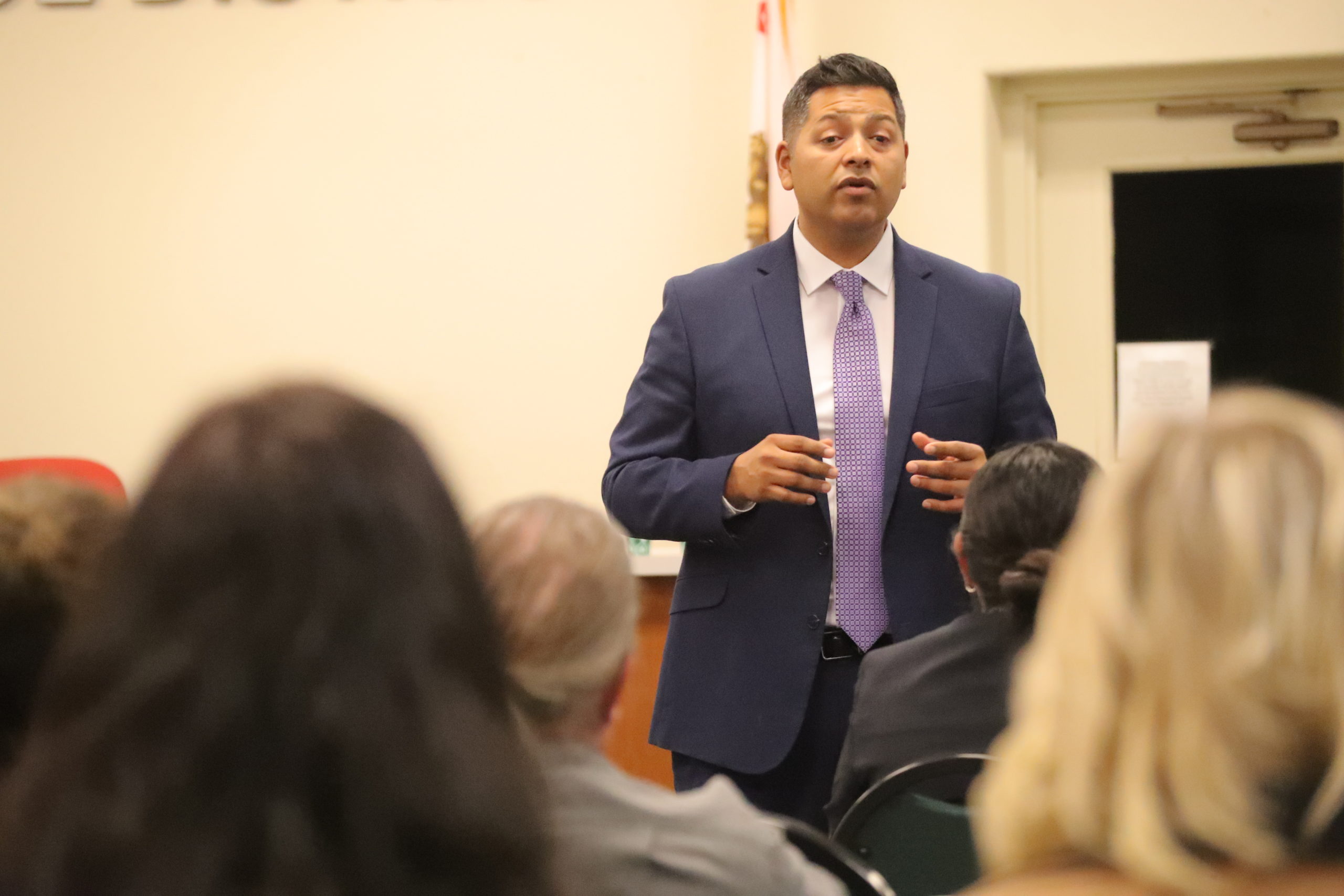Less than a week on the job and new Hollister School District Superintendent Diego Ochoa is already faced with the task of bringing his district’s special education program back into compliance with state and federal guidelines.
Before even officially joining the HSD staff, Ochoa was in the audience Jan. 8 when an internal report—contracted by the district—unearthed numerous deficiencies in Hollister’s special education program.
Complaints filed with the California Department of Education dating back to the 2015-16 school year included instances of staff not following mandated protocols for Individualized Education Programs (widely known as IEPs) by failing to provide instructional services and specialized academic instruction to students with special learning needs or disabilities.
In one case this year, a student was removed from class 16 times due to behavior before the district held a single IEP meeting to address the issue and find a path toward resolution. That non-action was in violation of federal regulations, according to the report’s findings. The district has since taken corrective action by providing a “more restrictive setting to address their needs,” the report concludes.
In another complaint from the 2017-18 school year, the state determined that the district failed to provide a required 180 minutes of occupational therapy services to a student enrolled at one of its schools. The district has since completed those mandatory hours.
“It was an extensive and thorough report,” said Ochoa, who was still introducing himself to site principals and staff last week during his first days as HSD’s education leader while also reviewing the special education report in order to take further corrective measures.
“I have been in special education my whole career. It’s really my comfort zone to be working in special education,” added Ochoa. “When I chose to interview for this position, one of the main motivators was the opportunity to work in a district that needed assistance and focus on its special education program.”
Problems in special education—among other issues he witnessed firsthand as a part-time substitute teacher in Hollister schools—is also what prompted first-term board president Stephen Kain to run for school board in November 2018.
“I saw serious issues not being addressed by the school district,” said Kain, who credited interim superintendent William Barr for starting the process of fixing the special education program that Ochoa has now taken on. “When we sat down with the new superintendent and learned of his vast background in special education, that’s one of the reasons we hired Diego Ochoa.”
Ochoa absorbed as much as he could when consultant Marilyn Shepherd gave her report on the state of the district’s special education department at the Jan. 8 school board meeting. He identified two main factors causing the noncompliance issues as staffing and procedures.
“When you are looking at how to improve special education, you first go to what are the procedures and do we have the appropriate procedures in place?” Ochoa explained. “Every IEP must be handled according to (education code) requirements. We need to establish non-negotiable procedures in that department.”
By law, an IEP, which is designed to meet a student’s unique needs, must include current performance (how the disability has affected the student’s ability to perform and progress); annual goals (short-term and benchmark); special education and related services (such as supplementary aids and services that the child needs); participation with nondisabled children; participation in state and district-wide tests (any necessary modifications to test-taking); and dates and places (when services begin, how often they will be provided, where they will be provided and how long they will last).
According to multiple complaints over the past three years, addressed in the report, Hollister schools failed to follow through on students’ individualized plans.
“We are aggressively trying to address the concerns as quickly as possible,” Kain said. “We are already making progress. This is not something that can be done overnight.”
Kain is confident that Ochoa’s experience and leadership will bring the district back into compliance.
According to the Jan. 8 report, current staffing at HSD “does not allow the special education department to monitor and proactively review IEPs for compliance.” Per the recommendations for staff, the district is recruiting a director of special education, whose only focus would be that department, as well as three clerical positions to “ensure the work of the department is completed.” The district will provide training and written procedures for staff, according to the report.
“Our vacant director of special education position was posted on Jan. 25 and it closes Feb. 25, and we will be interviewing immediately afterward and identifying the successful candidate,” said Ochoa, who has set a deadline of March 1 for all necessary job postings such as school psychologist and speech and language pathologists. “I also want an extensive analysis of how many students we have in the district who need services and how we can fit those needs in with the appropriate staff.”
Other recommended positions for the special education department were a Spanish translator to help with IEPs and three additional paraprofessionals to focus on student behavior.
“I’m very happy with the report. It’s a first step in moving forward. It gave us a roadmap of where we need to go,” said Kain. “I am happy with our progress so far, and I think we had to hit bottom before we can go forward.”
Ochoa also set up a 60-day timeline—beginning from Feb. 15—to have all procedures in place for the special education staff so they are adequately serving students and documenting the services they are providing for them.
“Once we have those set, then we have to invest the time to train staff on the procedures, which could take another 90 days in order to get every related employed trained,” Ochoa said.
Ochoa has already begun meeting with parents of students with special accommodations in their IEPs to enter into new agreements to make up for missed compensatory instruction time and rebuild their trust.
“We want to pace out the lost time so the students get the maximum benefit from it,” Ochoa said. “We want to bring parents into our offices and make them understand that we are ready to supply those compensatory special education services.”










